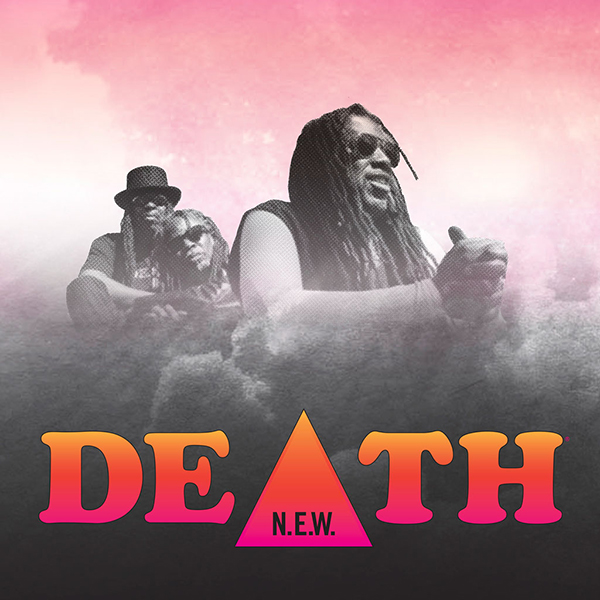No one ever predicted they would get this far. Having gradually reentered into the public consciousness over the past few years, Detroit proto-punk band Death have recorded their first new material in over three decades. A Band Called Death may have been the film the long-forgotten act needed to get the attention they always deserved for their legacy, but N.E.W. is an impressive continuation of what the Hackney brothers started back in the 1970s. Instead of yet another archival compilation (of which Drag City has released three so far), Death deliver ten entirely original, never-before-heard tracks. The title itself makes this clear: no matter what the merits are of the album, as a concept N.E.W. stands out for defying the odds simply by existing, with Death having reestablished their relevance to the conversation by creating this record.
Sonically, this album is cut from the same cloth as …For the Whole World to See, which collected tracks from Death’s 1974 sessions at United. “Keep on Knocking” and “Politicians in My Eye” clearly anticipated where Death would eventually go, yet N.E.W. dares to venture further afield. Guitars, by Bobbie Duncan, scream ferociously, as do the surviving Hackney brothers’ Dannis’ drums and Bobby’s bass. (Elder brother David died in 2000 from lung cancer.) But beyond demonstrating Death’s instrumental prowess, well over half the songs on here display attitude, without which punk would never become a global force.
What was most memorable about A Band Called Death was how its focus on the people in Death was in no way a distraction from how they made their music, even though the film could have downplayed it. Their riffs, their outsider status, their rhythms, their lack of concern for nuance when sneaking through their messages – though we take them for granted now, these touchstones weren’t always old hat. But to see how things have stagnated despite the prevailing narrative of progress – …For the Whole World to See, in fact – requires more effort than that found on N.E.W.; Death’s rabble-rousing provocations are less “proto” than “prescient.” With muscular tracks such as “Look at Your Life” plentiful here, N.E.W. surely represents a musical call to arms. Still, there are echoes of the past, and they aren’t entirely unwelcome.
With many songs, it is nearly uncanny the nostalgic resemblances. “Resurrection” brings to bear the idea of a long-delayed but ultimately delivered comeuppance that rings true for a punk band before punk. “Who Am I” aims for subtlety and achieves it, trading in guitar riffage and bass heft for something a little more delicate, at least for Death. “Story of the World” lives up to its name, featuring both creation and destruction, one of which may not be the first thing that comes to mind when you think of Malcolm McLaren or Vivienne Westwood. Ultimately, however, context is king: N.E.W. was released relatively recently – not in the late 1970s, when punk had already filled in the sketches that Death had drawn – yet it still stands tall. Death are full of innovative concepts, but more important, they also know how to bring them to life.
Though N.E.W. marks something unexpected from Death, the picking up of a thread whose final stitches many people assumed had been sewn long ago, in truth it was A Band Called Death that lay the groundwork for their reemergence from relative obscurity into outsider “discovery” all the way back to a fully functioning band. Even if Death had never made a new piece of music ever again (and even if the group never make any new music moving forward), that cinematic feature and subsequent reissues of Death’s former work was a gift to the world. That we now have something N.E.W. from the Detroit act feels like a sign from up above.
Check out our interview with Death here and read our review of Death III here. Stream N.E.W. below:
